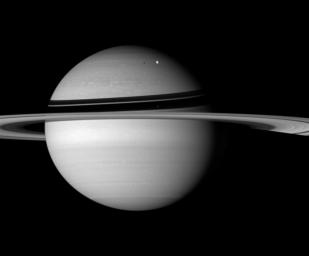
|
Snapshot from Afar
- Click the image above for a larger view
- Full-Res JPEG (1020 x 844) (30.7 kB)
- Full-Res TIFF (1020 x 844) (862.0 kB)
Caption:
The Cassini spacecraft snapped this Saturn portrait from the distance of Iapetus, just before beginning its close encounter with the two-toned moon.
Rhea (1,528 kilometers, or 949 miles across) is visible against the clouds of the northern hemisphere. Mimas (397 kilometers, or 247 miles across) stands out as a bright speck against the dark ring shadows, near center.
Enceladus is not pictured here, although it casts its shadow upon the northern hemisphere, to the left of Rhea.
This view looks toward the sunlit side of the rings from about 4 degrees below the ringplane. The rings disappear into the planet's shadow at right.
The image was taken in visible light with the Cassini spacecraft wide-angle camera on Sept. 9, 2007. The view was obtained at a distance of approximately 3.3 million kilometers (2.1 million miles) from Saturn. Image scale is 195 kilometers (121 miles) per pixel on the planet.
Background Info:
The Cassini-Huygens mission is a cooperative project of NASA, the European Space Agency and the Italian Space Agency. The Jet Propulsion Laboratory, a division of the California Institute of Technology in Pasadena, manages the mission for NASA's Science Mission Directorate, Washington, D.C. The Cassini orbiter and its two onboard cameras were designed, developed and assembled at JPL. The imaging operations center is based at the Space Science Institute in Boulder, Colo.
For more information about the Cassini-Huygens mission visit http://saturn.jpl.nasa.gov/home/index.cfm . The Cassini imaging team homepage is at http://ciclops.org .
Cataloging Keywords:
| Name | Value | Additional Values |
|---|---|---|
| Target | Saturn Rings | Enceladus, Iapetus, Mimas, Rhea, Saturn |
| System | Saturn | |
| Target Type | Ring | Planet, Satellite |
| Mission | Cassini-Huygens | |
| Instrument Host | Cassini Orbiter | |
| Host Type | Orbiter | |
| Instrument | Imaging Science Subsystem (ISS) | |
| Detector | Wide Angle Camera | |
| Extra Keywords | Grayscale, Shadow, Visual | |
| Acquisition Date | ||
| Release Date | 2007-10-19 | |
| Date in Caption | ||
| Image Credit | NASA/JPL/Space Science Institute | |
| Source | photojournal.jpl.nasa.gov/catalog/PIA09753 | |
| Identifier | PIA09753 | |
